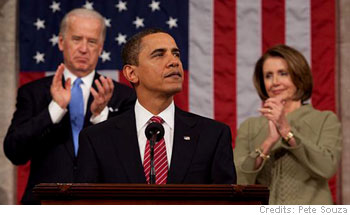 The very factors responsible for the passage of Obamacare may make it impossible to fund it adequately. There are certain myths about medical care that make it difficult to contain costs. The central myth, in not very exaggerated form, is that any care less than the best for anyone is the result of a contrived scarcity. If insurance companies were not so greedy for profit people could have the best care they deserve.
The very factors responsible for the passage of Obamacare may make it impossible to fund it adequately. There are certain myths about medical care that make it difficult to contain costs. The central myth, in not very exaggerated form, is that any care less than the best for anyone is the result of a contrived scarcity. If insurance companies were not so greedy for profit people could have the best care they deserve.
Spurred on by irresponsible politicians, many people object to attempts by insurance companies to save money by denying coverage for pre-existing conditions or treatments whose efficacy has not been proven, going above certain pre-agreed upon lifetime or yearly caps, exclusion of dental care, (previously) poor reimbursement for psychiatric services, and so forth.
So the supporters of Obamacare turned to government to make things better. Government will eliminate the contrived scarcity insurance market. (Of course, contrived by greed, even though this sector is already highly-regulated and filled with mandates.)
However, for Obamacare to work fiscally certain health care savings must materialize. Why? Well, because we live in a world of scarcity. Medical technologies and new drugs can be quite expensive. They can have small, but often noticeable benefits, in diagnosing, curing or alleviating illness. Some may give people just an extra few months of life or make what remains of higher quality.
But many people have an enduring faith that government knows how to eliminate greed in the provision of health care and to distribute it “fairly” when true scarcity raises its head.
In the first place, we do not have any generally-agreed upon notion of fairness when it comes to the allocation of (medical) resources. Second, because of that there is plenty of room for politically powerful interest groups to push resources in their own direction under the banner of fairness.
Greg Mankiw helpfully published some of the cost-savings caveats that the Congressional Budget Office issued as a supplement to their cost estimates for the latest bill:
The reconciliation proposal and H.R. 3590 would maintain and put into effect a number of policies that might be difficult to sustain over a long period of time. Under current law, payment rates for physicians’ services in Medicare would be reduced by about 21 percent in 2010 and then decline further in subsequent years; the proposal makes no changes to those provisions. At the same time, the legislation includes a number of provisions that would constrain payment rates for other providers of Medicare services. In particular, increases in payment rates for many providers would be held below the rate of inflation (in expectation of ongoing productivity improvements in the delivery of health care). The projected longer-term savings for the legislation also reflect an assumption that the Independent Payment Advisory Board established by H.R. 3590 would be fairly effective in reducing costs beyond the reductions that would be achieved by other aspects of the legislation.
Under the legislation, CBO expects that Medicare spending would increase significantly more slowly during the next two decades than it has increased during the past two decades (per beneficiary, after adjusting for inflation). It is unclear whether such a reduction in the growth rate of spending could be achieved, and if so, whether it would be accomplished through greater efficiencies in the delivery of health care or through reductions in access to care or the quality of care. The long-term budgetary impact could be quite different if key provisions of the legislation were ultimately changed or not fully implemented.
It seems to me that seniors are a very powerful interest group when it comes to getting health-care resources. And I have no doubt that they will be able to put a very sympathy-inducing face on their plight. They will say there is “no need” to cut their services to provide services to others. They will find some greed somewhere to blame for this – perhaps the greed of the rich who don’t pay enough in taxes.
This is how it will go. Decisions will be politicized and not in accordance with the ideas of some Ethics Tsar.
Some will no doubt say that this takes money out of medical decisions. Instead of rationing by ability to pay we shall have allocation by other, better criteria.
Yet the criteria of special interests (with money) are not obviously better than willingness to pay. At least the latter has the advantage of spurring on innovation.
What we need is a recognition that not everyone can get the best care all of the time and that resources must be used efficiently. The question is will this be done in a market-friendly way (medical savings accounts, competition of insurance companies across state lines, etc.) or by central direction?
This, as always, is the question of our age.
- Bulenox: Get 45% to 91% OFF ... Use Discount Code: UNO
- Risk Our Money Not Yours | Get 50% to 90% OFF ... Use Discount Code: MMBVBKSM
Disclaimer: This page contains affiliate links. If you choose to make a purchase after clicking a link, we may receive a commission at no additional cost to you. Thank you for your support!


Leave a Reply